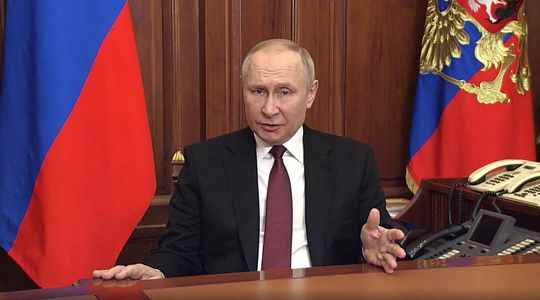A host of Western sanctions on one side, to which Russia is trying to respond. Direct negotiations underway between the attacker and the attacked, on the border with Belarus, on the other. At the beginning of the week, the conflict between Russia and Ukraine seems to be able to swing in two opposite directions. Are we heading towards a military hardening or the beginning of a de-escalation? Five articles from the editorial staff to see more clearly.
- Where will this war lead? The assumptions on the table
On the fifth day of the conflict, Russia is still struggling to make noticeable differences on the ground. Ukraine is resisting, for the time being, the attack carried out on its territory.
Four scenarios are for the moment very discussed about the continuation of the operations: the beginning of negotiations, opening the door to a diplomatic evolution of the conflict, and possible ceasefire; militarily, a partition of Ukrainian territory, with the definitive separation of the two self-proclaimed republics of Donetsk and Lugansk; the establishment of a (pro-Russian) puppet regime in Ukraine, after a victory for Moscow; Finally, a widening of the conflict cannot be ruled out – could Vladimir Putin go further than Ukraine?
READ OUR ARTICLE >> War in Ukraine: negotiations, partition… What options for the continuation of the conflict?
- Why is Putin talking about the nuclear option?
Sign of a notable worsening of the situation, due to the very numerous economic sanctions formulated by Western governments against Russia, the Russian president put his nuclear deterrent forces on alert, Sunday, February 27. His words are worrying, but, in reality, it seems unlikely that the leader of the Kremlin will have recourse to this supreme weapon.
“President Putin cannot ‘press the red button’, in a moment of madness worthy of Doctor Strangelove”, commented, with L’Express, Benjamin Hautecouverture, researcher at the Foundation for Strategic Research, nuclear specialist . “In deciding to increase the level of nuclear pressure, he probably shows an impatience with operational realities that disappoint him,” he judges.
READ OUR INTERVIEW >> Nuclear threat: “Putin cannot press the red button alone”
- How does NATO defend itself against Russia?
The inexorable progress of the North Atlantic Treaty Organization (NATO) in Eastern Europe served as justification for the war wanted by Vladimir Putin in Ukraine. How is this alliance reacting today? Without being able to militarily defend Ukraine, which is not a member of the organization, partnership agreements have made it possible to strengthen the local army and improve its supervision, as well as its level of training. Above all: NATO remains on its guard about a possible widening of the conflict towards Poland bordering Ukraine, or even Romania, the Baltic countries and even Finland – also not a member of NATO.
“NATO is doing everything to avoid this scenario by strengthening its presence on the eastern flank, says Amélie Zima, researcher in international relations at the Thucydide Center of the Panthéon-Assas Paris II University. Several member countries will participate in this reinforcement and the France plays a leading role here since the Minister of the Armed Forces, Florence Parly, announced at the end of January the dispatch of more than 300 soldiers to Romania.The objective of this new deployment is to strengthen the deterrent posture of the NATO, already present with battalions of around 1,000 soldiers each in Poland and the Baltic States.
READ OUR INTERVIEW >> War in Ukraine: “NATO is doing everything to avoid a Russian attack against its members”
- Economic warfare: what consequences for the commodity market?
The conflict is not just a military confrontation. In response to the attack in Ukraine, the West has already heavily sanctioned Russia economically and directly targeted its leader Vladimir Putin, whose assets have been frozen. Russia has, this Monday, restricted the flights of airlines belonging to 36 countries (European Union, Canada, United Kingdom …). The markets are also beginning to fear the consequences of this war in two major countries with regard to agriculture and the production of metals.
Russia and Ukraine alone account for nearly 30% of world wheat exports, and the two countries are also essential on the market for corn, barley, sunflower and rapeseed, underlines our journalist Emmanuel Botta. Many industrialists have their eyes riveted on this conflict, while Russia is the second largest aluminum producer on the planet, the same for nickel, and takes over almost half of the world’s palladium production. , he continues. However, these are “three essential metals in the race for climate transition committed foot to the floor by Europe”, points in return Catherine Karyotis, professor of finance at Neoma Business School.
READ OUR DECRYPT >> Wheat, corn, nickel… The war in Ukraine puts the commodity markets in meltdown
- What effects for the “cyberwar” already at work?
The conflict between Russia and Ukraine also takes place in what is called cyberspace. “Cyber warfare” is, as in the military, a matter of targeted attacks with the use of specific weapons (ransomware, disinformation, DDoS attacks, etc.), for a strategic purpose. Several observers fear an intensification of fighting in this area. “One of the most risky targets is the telecom network in order to deprive Ukrainians of the possibility of telephone calls or of connecting to the Internet”, indicates, among others, Maria Avdeeva, research director of the Ukrainian think tank European Expert Association .
More broadly, this is also something that could easily advance the war beyond Ukraine. According to Wavestone cybersecurity expert Gérôme Billois, “the financial sector is very vigilant with regard to these risks”. However, it is still difficult to say what to expect. “The doctrines of engagement in cyberspace exist, but they are recent and have been used little for the time being. We are walking in unknown territory”, also confides this specialist.
READ OUR LIGHTING >> Cyberattacks, false information: these weapons that Russia masters brilliantly
